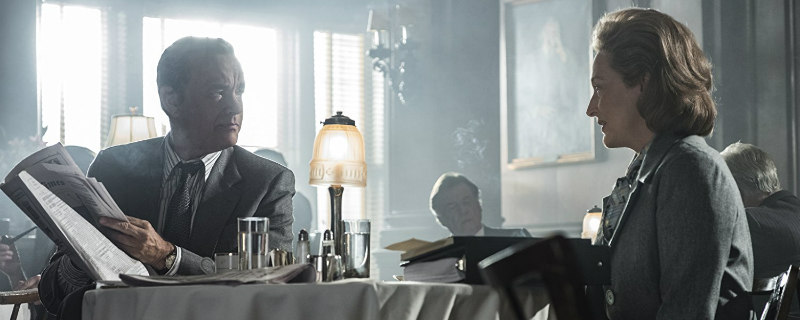Review by Eric Hillis
Directed by: Steven Spielberg
Starring: Meryl Streep, Tom Hanks, Sarah Paulson, Bob Odenkirk, Tracy Letts, Bradley Whitford, Bruce Greenwood, Matthew Rhys, Alison Brie, Carrie Coon, Jesse Plemons

In 1971, military analyst Daniel Ellsberg (played here by Matthew Rhys) leaked a top secret analysis of US government decisions involving Vietnam, which came to be known as the Pentagon Papers, to The New York Times and The Washington Post. Steven Spielberg's The Post focusses on the latter publication as its owner Kay Graham (Meryl Streep) and editor Ben Bradlee (Tom Hanks) weigh up the consequences of publishing the report, an action which would irrevocably damage the paper's already fractious relationship with Nixon's White House and possibly result in jail sentences for the pair and the journalists involved in reporting the story.
If you wish to learn the exact contents of the Pentagon Papers, look elsewhere. Spielberg's drama isn't interested in analysing or critiquing the actions taken by a succession of Democrat and Republican administrations. The Post isn't a political thriller so much as an old-fashioned newspaper movie, which is just as well as it's far more successful as the latter than the former.

Spielberg fetishes the world of twentieth century journalism, the open floor office of the titular newspaper soundtracked by the clickety clank of a hundred typewriters, desks rumbling as the printing presses fire into action on the floor below, blue collar and white collar workers each playing their part in getting the truth (whatever that means) out to the American public.
Yet while there's a veneration of the fourth estate as the buffer between government propaganda and honesty, The Post also makes it clear that Graham and Bradlee's key motivation lies in selling newspapers. There's a subplot that sees the former float the paper she took over following her husband's death on the stock exchange in an attempt to keep the printing presses running in the face of growing competition from TV news.
[ READ MORE: Now on Netflix - It ]
Key to The Post is its depiction of how women were treated in an overwhelmingly male-dominated industry. Thankfully, and unlike his insufferably reverential Lincoln biopic, Spielberg doesn't have his female characters behave in an anachronistic manner, and for the most part he lets his images tell you everything you need to know about a woman's place in the world of the '70s by how he places his women in his frames.

Streep's physical size is contrasted with the men she has to deal with, who flock around her in intimidating fashion, vultures waiting to pick her carcass at the first sign of weakness, physically excluding her from conversations and subtly forcing her to walk behind them. When Streep opens a door to be greeted by a room full of grey-haired men, it recalls that moment in Star Wars when Han and Chewie turn a corner and run smack into a horde of stormtroopers, a reminder that Spielberg is one of the few filmmakers who dares translate blockbuster storytelling techniques to intimate dramas like this.
What's so powerful is that Spielberg never has Streep stand up to the men, which makes the point all the more effective. If you're a man with any degree of empathy towards the opposite sex, it's impossible not to feel like a bit of a shit watching the obnoxious, weaponised masculinity on display, Graham fidgeting with her glasses in frustration.
[ READ MORE: Now on Netflix - Thoroughbreds ]
Towards the end however it seems that Spielberg begins to worry that we haven't been paying attention, as his characters crudely verbalise the film's themes in cringeworthy speeches scored with arguably the most unnecessary score of John Williams' career. The canny way Spielberg visually portrays Bradlee's wife Tony (Sarah Paulson) - seen in the background counting the male heads she needs to make sandwiches for, and standing awkwardly in adjacent rooms waiting for an opportune moment to move around her own house - tells us far more about her status as the wife of a powerful man than the speech she later makes to her husband.

The final laps of The Post are dogged by such tackiness, with a Watergate coda that plays like the post-credits stinger of a Marvel movie; a WP journalist reciting a judge's verdict speech while Williams's strings soar to tell us what an important moment for America this is; a shot from the back Nixon impersonator who looks like one of the masked villains of Point Break; and most egregious of all, a young woman of colour thanking the white heroine for her bravery.
Offering the director at his best and worst, The Post is in some ways the ultimate Spielberg movie, one you might show an alien visitor to demonstrate why he causes so much division among critics and audiences. His fans will point to exquisite visual storytelling here that makes a mockery of the televisual blandness of most modern Hollywood productions. His critics will highlight the didactic speechifying and seeming lack of faith in the intelligence of his audience. Both are valid stances, but the former swings this one for me. For all its faults, in its best moments The Post gives us one of American cinema's greatest filmmakers schooling his peers and young imitators on how to grip an audience with images over words. That Streep and that Hanks aren't half bad either.

The Post is on Netflix UK now.
HELL ON THE BORDER Director Wes Miller’s Top Five Western Movie Influenceshttps://t.co/3v2KQSrcH8 pic.twitter.com/LxxpmUqk9c— 𝕋𝕙𝕖 𝕄𝕠𝕧𝕚𝕖 𝕎𝕒𝕗𝕗𝕝𝕖𝕣 (@themoviewaffler) March 17, 2020


